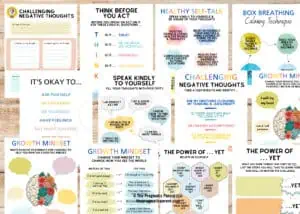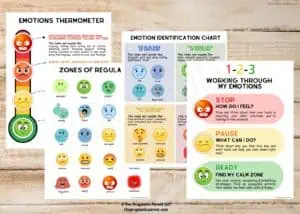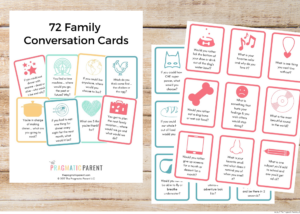Empower your children to thrive with empathy and gratitude by curbing entitlement behaviors. Your roadmap to raising compassionate, appreciative individuals starts here.

Nurturing Empathy and Gratitude: Cultivating Humble Hearts instead of Entitlement
On the winding road of parenting, we often come across challenges that require us to steer our children onto the right path. One such challenge is dealing with entitlement behaviors in our young ones.
The modern world offers them abundance and highly addictive situations of instant gratification, but it’s because of this, that it’s become more crucial than ever to ensure they grow up to be empathetic, grateful, and appreciative individuals.
My personal experience with entitlement began poking it’s head out in the past year and my husband and I knew we had to course-correct as we could see the behavior began to cause problems in our home and we felt like we were butting heads more often than naught.
It didn’t feel good.
What kinds of behavior am I referring to?
Entitlement.
At first we thought maybe it was part of the “tween” phase and had to do with independence around this age of child-development, but when things persisted, we both knew it was time to reign in some things.
We saw a lack of willingness to help around the house, not picking up their plates after dinner, complaining about meals instead of being grateful, and the same went with gifts and experiences… we began to see less and less gratitude and more expectation they were entitlement to having the experiences and gifts they received, with zero gratitude.
I was done with this entitled behavior and maybe you’re seeing some of this at your house too and want to know what to do. I hear you!
Understanding Entitlement: The Starting Point
Entitlement behaviors often arise when children consistently receive without appreciating the value of what they have.
We, at this time, live in a world of instant-gratification and abundance. Dr. Anna Lembke refers to the time we’re living as the time of indulgence in her incredible book, Dopamine Nation.
This can lead to a lack of empathy and an inability to see beyond their immediate desires, avoiding taking into consideration other’s feelings and circumstances. But, fret not, as proactive parenting can effectively curb these behaviors and instill empathy and gratitude in their hearts. We’ll talk about how to do this later in the article.
Recognizing entitlement behaviors in your children is the first step towards guiding them onto a path of empathy and gratitude. Here are some common examples that might resonate with you.
Signs of Entitlements Parents Might Identify With:
-
Unappreciative Attitude
If your child consistently shows a lack of appreciation for the things they have, such as complaining about gifts, food, or privileges, it could be a sign of entitlement. They might take these things for granted without understanding their value.
For Example: Your child receives a new toy and immediately expresses disappointment because it’s not the exact model they wanted.
-
Demanding Instant Gratification
Children who expect their desires to be fulfilled immediately may be exhibiting entitlement. They struggle with patience and might become frustrated when they can’t have what they want right away.
For Example: Your child throws a tantrum in the store because you won’t buy them a toy they’ve just seen.
-
Disregarding Others’ Feelings
Entitlement often leads to a lack of empathy for others. If your child consistently disregards the feelings and needs of their peers or family members, it might be time to address this behavior.
For Example: Your child refuses to share toys with their friends during playdates and insists on having everything their way.
-
Inability to Handle Disappointment
Children who haven’t learned to cope with disappointment can exhibit entitlement behaviors. They might struggle when things don’t go their way and become easily frustrated or upset.
For Example: Your child becomes extremely upset and refuses to participate in a family outing because their preferred activity wasn’t chosen.
-
Ignoring / Disregarding Responsibilities
When children consistently avoid chores, homework, or other responsibilities, they might believe that these tasks are beneath them. This behavior can stem from a sense of entitlement.
For Example: Your child refuses to clean up after themselves, insisting that it’s someone else’s job to take care of their mess.
-
Lack of Gratitude in Their Actions
Children who rarely say “thank you” or fail to express gratitude through actions might be struggling with entitlement. They might not fully understand the effort or thoughtfulness behind gestures from others.
For Example: Your child receives a handmade gift from a relative and barely acknowledges it before moving on to other things.
By being aware of these examples, you can better assess whether your child is displaying entitlement behaviors.
Remember, addressing these behaviors early on with can lead to significant positive changes in their attitude and outlook, and learn to lead with a more compassionate and humbler outlook on life.

Take Action: Redirect a Sense of Entitlement into Empathy and Gratitude
Let’s delve into actionable strategies that will help you redirect a growing sense of entitlement into a genuine understanding of empathy and gratitude.
-
Lead by Example
Children learn through observation and imitation. Display the qualities of empathy and gratitude in your daily life. Express appreciation for the little things, show kindness to others, and let your children witness your genuine acts of giving. When they see these traits in action, they’re more likely to embrace them as their own.
Practice Example: Let your child see you donate to a charity or help a neighbor in need. Explain your actions, emphasizing the importance of supporting others.
-
Foster Open Communication
Create an environment where your children feel comfortable discussing their feelings. Encourage them to express their thoughts and emotions openly. When they feel heard and understood, they’re more likely to extend the same empathy to others.
Practice Example: During family discussions, ask your child how they would feel in certain situations. Prompt them to consider different perspectives, helping them develop a more empathetic outlook.
-
Cultivate a Gratitude Ritual
Establish a daily or weekly gratitude ritual where your family shares what they’re thankful for. This practice shifts the focus from what they lack to what they have, nurturing a sense of appreciation.
Practice Example: Before dinner, take turns sharing one thing you’re grateful for that day. Encourage your child to reflect on experiences, people, or even challenges that offer opportunities for growth.
Related: How to Help Your Kids Develop an Attitude of Gratitude
-
Engage in Meaningful Acts of Kindness
Engaging in acts of kindness reinforces empathy. Participate in volunteer activities or perform small acts of kindness as a family, like making care packages for those in need or writing heartfelt notes to brighten someone’s day.
Practice Example: Dedicate a weekend to volunteering at a local shelter or organizing a neighborhood cleanup. Discuss the impact of your actions and how they make a difference.
Related: 35 Random Acts of Kindness Calendar (Free Printable)
-
Teach Delayed Gratification
Help your child understand that not every desire can be instantly fulfilled. Teach them the value of patience and the satisfaction that comes from waiting for something they truly want. This helps in curbing impulsive entitlement.
Practice Example: Create a savings jar for a special toy or experience. Encourage your child to contribute a portion of their allowance to the jar, teaching them the reward of delayed gratification.
In Conclusion:
As parents, it’s our privilege and responsibility to nurture our children’s character. Outside forces (school, peers, coaches, relatives) may contribute to behavior, but ultimately as a parent, it’s your responsibility to guide this.
What you allow, is what you will see.
Tackling entitlement behaviors may seem daunting, but with heart-centered approaches, we can guide our children toward empathy and gratitude. By leading by example, fostering open communication, cultivating gratitude, engaging in acts of kindness, and teaching delayed gratification, we can help our children become not only appreciative individuals but also beacons of compassion in a world that needs it.
Related Resources:
- Navigating Puberty: Tween/Teen Hormonal, Physical, Emotional Changes
- Raising an Emotionally Intelligent Son
- How to Best Support a Child Who is Shy
- How Love and Parental Affection Affect Child Development
- Why Empty Threats Don’t Work (And What To Do Instead)
- The Known (and Unknown) Signs Of Child Anxiety




